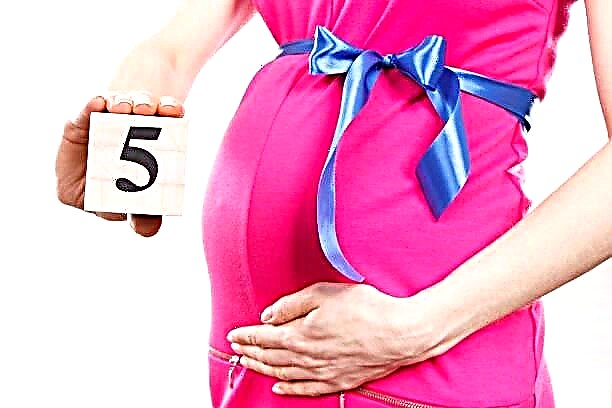The diet of a breastfeeding mother should consist of a balanced and complete set of foods. The well-being of the baby, his development and health for years depends on what and how the nursing mother eats. The famous doctor E. Komarovsky in his writings gives advice on nutrition for nursing mothers.

Exclude from the diet
All the advice of a well-known pediatrician is advisory in nature, however, in matters of nutrition, the doctor adheres to the position of perseverance. Primarily products that provoke allergies are excluded: citrus fruits, chocolate, strawberries, eggs, seafood. Mom, especially in the first days and weeks, should carefully monitor the baby's reaction to the new product she has eaten. If in doubt about a product, the doctor advises first to eat a small amount of it and, depending on the child's reaction, decide whether to include it in the diet in the future.
All products, due to which milk can change taste and smell, become unpleasant for the baby, are excluded from the diet. This group includes sour, salty, spicy dishes, pungent spices. A number of foods (legumes, cabbage, sodas) have a bad effect on the baby's intestines. Their use can increase gas production and in some cases cause diarrhea.
To digest fatty foods, the body requires additional efforts; with increased fat content of breast milk, it is difficult for a child to suck it out, and for a mother to express it. Therefore, the doctor does not recommend saturating food with fatty foods (fatty sour cream, butter, pork, nuts), in which milk will become more nutritious, but also difficult to digest. At the same time, vegetable fats are preferred over animals.
The diet of a nursing mother
The mother's adequate nutrition is the main source for the child to receive the substances necessary for development.
What to eat and drink:
- Meat and fish (lean);
- Dairy and sour-milk products (milk, fermented baked milk, kefir, etc.);
- Vegetables and fruits: cherries, watermelon, grapes, apples, pears, apricots. We also read: fruits with hepatitis B and vegetables with hepatitis B;
- Dried fruits (dried apricots, raisins) and compote from them;
- Greens;
- Green tea;
- Not dried or salted fish;
- Stews, baked and boiled dishes.
Don't eat or drink:
- Fatty foods (including fatty broth);
- Coffee;
- Spicy, salty, sour foods;
- Smoked and fried foods;
- All types of conservation;
- Cocoa and cocoa-containing products (candy and chocolate);
- Sweets containing butter cream;
- Peas;
- Citrus fruits (oranges, tangerines, lemons);
- Baking with yeast;
- Red berries;
- Mushrooms.
The daily diet should contain at least 0.5 kg of fresh fruit. If mom is slim enough and can afford, Komarovsky recommends eating a plate of semolina at night. All the products that the mother teaches the baby to during pregnancy and during breastfeeding will subsequently be perceived by the child with pleasure, because this is a familiar food.
Diet recommendations

Read a detailed article on nutrition for a nursing mother here
A well-known pediatrician advises to be very careful about the presence of exotic fruits or imported products in the diet. Such food is obviously unknown to our digestive system and its assimilation by the body may be incomplete. Putting stress on the liver or pancreas negatively affects breast milk.
The doctor gives some more advice:
- Avoid overeating. It will be more useful to eat a little;
- With an obsessive desire to eat something forbidden, you can "knock down the hunt" with a tiny amount of this product;
- Doubts about the product should cause a complete rejection of it;
- Do not eat at night;
- If circumstances forced you to drink alcohol, then a little red wine is permissible;
- Taking vitamin complexes should be regular.
Drink issues
Dr. Komarovsky is quite clear about removing the issue of additional forced drinking for nursing mothers (although many experts claim that a large amount of drinking does not affect milk production in any way, many nursing mothers are convinced of the opposite from their own experience). The pediatrician adheres to the principle of naturalness as much as possible in this matter: if the mother and the baby are all right and there is enough milk, then there is no need to drink anything extra, beyond the woman's desire ..
If there is not enough milk, then after each feeding, the mother needs to replenish the lost fluid and drink 300-500 ml of fluid. Night feeding should be no exception, so it is best to prepare the drink in advance.
Drinking preferred:
- Sweet green tea with milk;
- Dried fruits compote;
- Apple, grape, carrot juice (while remembering about moderation);
- Boiled and baked cow's milk, fermented milk products (fat content 2.5% and below).
Various drugs are known, medicinal (nicotinic acid, pyrroxan, apilak) and food (nuts, beer, yeast), which have the property of increasing lactation. However, a well-known pediatrician advises not to overestimate their importance.
The principles of Dr. Komarovsky gained popularity for their simplicity and closeness to nature, they are advisory in nature, relying on the natural needs of a nursing mother and baby.



